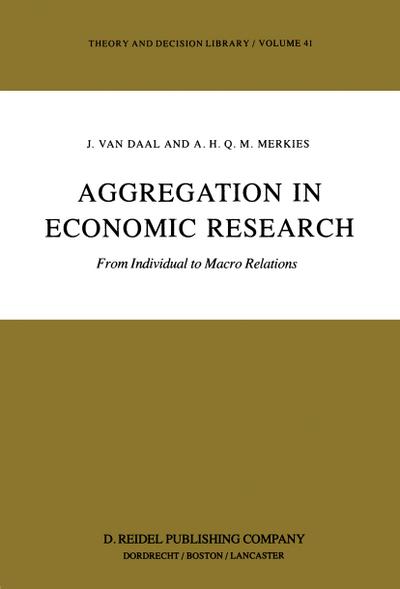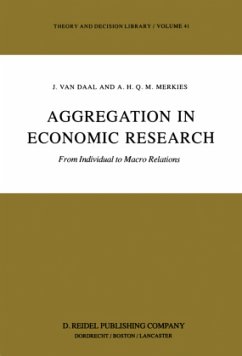
Aggregation in Economic Research : From Individual to Macro Relations - gebonden uitgave, pocketboek
1984, ISBN: 9027717125
[EAN: 9789027717122], Neubuch, [SC: 0.0], [PU: Springer Netherlands], SOZIALWISSENSCHAFTEN; WISSENSCHAFT / ECONOMICPOLICY; INTERVIEW; MICROECONOMICS; PRODUCTION; SIMULATION, Druck auf Anf… Meer...
| ZVAB.com AHA-BUCH GmbH, Einbeck, Germany [51283250] [Rating: 5 (von 5)] NEW BOOK. Verzendingskosten:Versandkostenfrei. (EUR 0.00) Details... |

ISBN: 9789027717122
Our interest in problems of aggregation originates from about seven years ago when we became involved in research in the field of applied microeconomics. To our astonishment a vast majori… Meer...
| Orellfuessli.ch Nr. A1020415591. Verzendingskosten:Lieferzeiten außerhalb der Schweiz 3 bis 21 Werktage, , Versandfertig innert 1 - 2 Wochen, zzgl. Versandkosten. (EUR 17.62) Details... |

1984, ISBN: 9789027717122
Our interest in problems of aggregation originates from about seven years ago when we became involved in research in the field of applied microeconomics. To our astonishment a vast majori… Meer...
| Orellfuessli.ch Nr. 4685868. Verzendingskosten:Nenhum envio para o seu destino., exclusief verzendingskosten Details... |

ISBN: 9789027717122
Our interest in problems of aggregation originates from about seven years ago when we became involved in research in the field of applied microeconomics. To our astonishment a vast majori… Meer...
| Indigo.ca new in stock. Verzendingskosten:zzgl. Versandkosten., exclusief verzendingskosten Details... |

ISBN: 9789027717122
Our interest in problems of aggregation originates from about seven years ago when we became involved in research in the field of applied microeconomics. To our astonishment a vast majori… Meer...
| Springer.com Nr. 978-90-277-1712-2. Verzendingskosten:Worldwide free shipping, , zzgl. Versandkosten. (EUR 0.00) Details... |


Aggregation in Economic Research : From Individual to Macro Relations - gebonden uitgave, pocketboek
1984, ISBN: 9027717125
[EAN: 9789027717122], Neubuch, [SC: 0.0], [PU: Springer Netherlands], SOZIALWISSENSCHAFTEN; WISSENSCHAFT / ECONOMICPOLICY; INTERVIEW; MICROECONOMICS; PRODUCTION; SIMULATION, Druck auf Anf… Meer...

bij Orellfuessli.ch
ISBN: 9789027717122
Our interest in problems of aggregation originates from about seven years ago when we became involved in research in the field of applied microeconomics. To our astonishment a vast majori… Meer...
1984
ISBN: 9789027717122
Our interest in problems of aggregation originates from about seven years ago when we became involved in research in the field of applied microeconomics. To our astonishment a vast majori… Meer...
ISBN: 9789027717122
Our interest in problems of aggregation originates from about seven years ago when we became involved in research in the field of applied microeconomics. To our astonishment a vast majori… Meer...
ISBN: 9789027717122
Our interest in problems of aggregation originates from about seven years ago when we became involved in research in the field of applied microeconomics. To our astonishment a vast majori… Meer...
Bibliografische gegevens van het best passende boek
Gedetalleerde informatie over het boek. - Aggregation In Economic Research: From Individual to Macro Relations
EAN (ISBN-13): 9789027717122
ISBN (ISBN-10): 9027717125
Gebonden uitgave
Verschijningsjaar: 1984
Uitgever: Kluwer Academic Publishers
340 Bladzijden
Gewicht: 0,672 kg
Taal: eng/Englisch
Boek bevindt zich in het datenbestand sinds 2007-06-04T20:32:57+02:00 (Amsterdam)
Detailpagina laatst gewijzigd op 2023-08-13T08:08:42+02:00 (Amsterdam)
ISBN/EAN: 9027717125
ISBN - alternatieve schrijfwijzen:
90-277-1712-5, 978-90-277-1712-2
alternatieve schrijfwijzen en verwante zoekwoorden:
Auteur van het boek: van daal, merki, microeconomics
Titel van het boek: aggregation economic research, macro economic, theory relations, theory and decision library
Gegevens van de uitgever
Auteur: J. van Daal; A.H. Merkies
Titel: Theory and Decision Library; Aggregation in Economic Research - From Individual to Macro Relations
Uitgeverij: Springer; Springer Netherland
321 Bladzijden
Verschijningsjaar: 1984-01-31
Dordrecht; NL
Taal: Engels
160,49 € (DE)
164,99 € (AT)
177,00 CHF (CH)
Available
XIV, 321 p.
BB; Hardcover, Softcover / Soziologie; Soziologie; Verstehen; economic policy; interview; microeconomics; production; simulation; Sociological Methods; BC
I. Introduction.- I. Introduction.- II. On Theory.- 1. Aggregation without side conditions.- 2. Aggregation of production functions under optimum conditions.- 3. Aggregation and individual preferences.- 4. Aggregation and the distribution of individual characteristics.- 5. Linear aggregation and estimation.- 6. Aggregation over arguments of a function.- III. Some Applications.- 7. Aggregation and consumer behaviour.- 8. Collective choice and macro-economic policy.- IV. Epilogue: Optimal aggregation.- IV. Epilogue: Optimal aggregation.- References.- Author Index.Andere boeken die eventueel grote overeenkomsten met dit boek kunnen hebben:
Laatste soortgelijke boek:
9789400963344 Aggregation in Economic Research (J. van Daal; A.H. Merkies)
< naar Archief...

